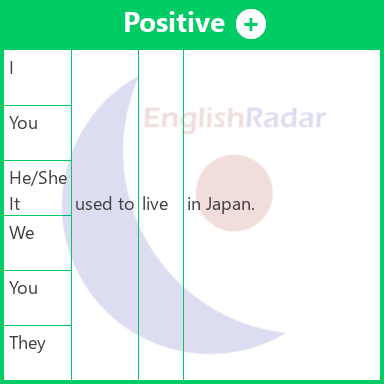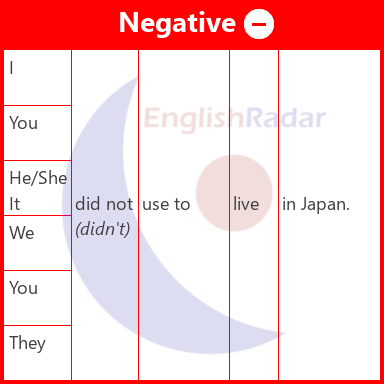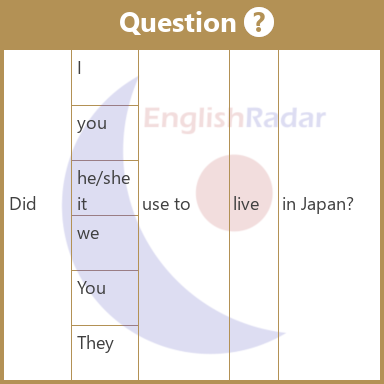USED TO explained - This free English grammar lesson explains what is it, how we form it and when we use it AND includes examples & English quizzes.
Use & examples |
The verb used to is a modal verb and we only use it in the past tense to describe:

(1) Past habits or actions
It happened many times in the past (not just once), and is not the same now.
- I used to play tennis (but I don’t now).
- I didn’t use to go to the gym (but I do now).

(2) Past state or situation
It was the same state or situation for a period of time in the past, but is not true now.
- I used to live in Japan (but I don’t now).
- I didn’t use to live in Germany (but I do now).
Form |
The form is:
use(d) to + infinitive
Here are examples of the affirmative (positive) form, negative form and question form using the verb 'live'.



Short answers
- Yes, I did. / No, I didn't.
- Yes, you did. / No, you didn't.
Pronunciation
The pronunciation for all three forms is the same: /ju:stə/.
Even though the spelling is different for the negative form and question form (use to), the pronunciation is the same as for the affirmative form (used to). We do not pronounce the 'd'.
Notes |
Time expressions
1) Examples of time markers that can be used:
I always/never used to play football.
He didn't use to play tennis on Saturdays/every Saturday.
They used to go swimming three times a week.
2) Examples of time markers that CANNOT be used:
I used to study Spanish yesterday.
He didn't use to play golf last week/year.
They used to work in London for three years.
Using 'would' instead of 'used to'
1) We can use 'would' to describe past habits or actions.
He used to play tennis on Saturdays = He would play tennis on Saturdays.
2) We can also use 'would' to describe repeated states in the past that were temporary.
I always used to worry about exams = I would always worry about exams.
Quizzes |
Quiz 1: Past habits, states or situations that are not true now
[Topic: Sport and leisure activities]